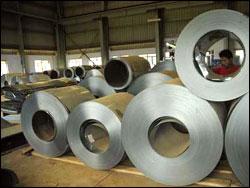 | « Back to article | Print this article |
Even when the protest against Vedanta over mining in Niyamgiri was at its peak, Hindalco Industries quietly carried on with its work in Mali Parbat, just miles away from the Vedanta project. But not any more.
 With locals protesting against Hindalco's move to mine Mali Parbat, the contractor who was working on making the mine operational has left. All work at the mine has stopped. However, at the Aditya smelter site, in Lapanga and away from the mine, work is on in full swing and the company hopes to complete the 359-kilo tonne aluminium smelter and a 900-Mw power plant in 2013.
With locals protesting against Hindalco's move to mine Mali Parbat, the contractor who was working on making the mine operational has left. All work at the mine has stopped. However, at the Aditya smelter site, in Lapanga and away from the mine, work is on in full swing and the company hopes to complete the 359-kilo tonne aluminium smelter and a 900-Mw power plant in 2013.
The Utkal alumina refinery of 1.5 million tonnes in Kansariguda is expected to be completed by March 2013. However, with the mining of bauxite under a cloud, the fate of the project is hanging by a thread.
Vedanta, in the same region, has already faced the ire of locals and NGOs. The Union environment ministry has cancelled its mining licence and the company relies on bauxite from Gujarat and Chhattisgarh.
Owing to the non-availability of captive bauxite, Vedanta has been posting losses quarter after quarter. It has decided to shut the refinery.
The locals are upset with Hindalco's bauxite mining plans in Mali Parbat, saying it will make the water in the area disappear and jeopardise the livelihood of tribal people in the region. Hindalco refused to comment on issues with the locals in Odisha.
While Vedanta stayed in the limelight, Hindalco continued its work, though the local people protested against its mining activities from 1996. While in Vedanta's case it was the Lado Sikaka spearheading the movement, in Hindalco's it has been Prakrutik Sampad Surakshya Parishad.
In Vedanta's case, the problem arose as the Niyamgiri Hills were a subject of worship for the Dongria Kondh tribals, who protested against the exploitation of their sacred hill. In Mali Parbat, Hindalco is being accused of jeopardising the agricultural livelihood of local people.
Both companies wanted to set up aluminium refineries and smelter and mine bauxite. The region has the world's best and among the largest bauxite reserves. The government-owned Nalco, earlier known as the National Aluminium Company, has a refinery in Koraput.